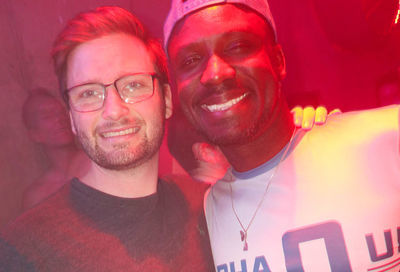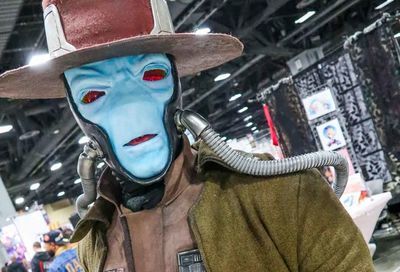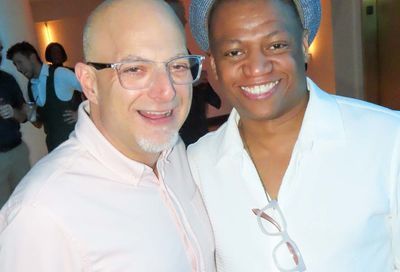Massachusetts prepares to fight for transgender rights
Massachusetts conservatives want to repeal transgender protections. We meet those fighting to ensure it doesn't happen.

Kaden Mohamed has rejected his birth gender for as long as he can remember. His earliest memories involve being two or three years old and trying to pee standing up, or pretending to shave, just as his dad did each morning. Yet, when Mohamed entered school, he was forced to conform to the way girls were “supposed” to act. Hiding his true identity was the only way he could avoid standing out.
“I pushed it really far down, and buried it in my subconscious,” says the 24-year old. “The other thing was, I’m not that old, but the Internet and society was not what it is today. So even the language to describe what I was feeling was not something I had. I’d heard the word ‘tranny’ before and ‘transvestite,’ but to me, those are offensive words. Even growing up in New York City, that was the extent of my exposure.”
It wasn’t until Mohamed attended Wellesley College in Massachusetts that he finally explored his gender identity. He met transgender people, majored in women’s and gender studies, and then “the pieces began to fall into place.” By his junior year, he was identifying as male and had begun to transition. His experience led to him becoming involved with efforts to make the culture at Wellesley College — a women’s liberal-arts college — more accepting for transgender students.
It was through that work that Mohamed was asked to join the Massachusetts Transgender Political Coalition (MTPC). There, he worked to amend Massachusetts’ nondiscrimination law, which at the time only provided protections for transgender people in the same way it does gays, lesbians and bisexuals. In July, after years of work by MTPC and its allies, lawmakers finally approved a transgender nondiscrimination bill. It was subsequently signed into law by Republican Gov. Charlie Baker, and took effect at the start of October.
“It was a moment of relief, and a moment of ‘finally, we have progress’ when the bill passed,” Mohamed says. “It was, to me, what marriage equality was to other people. It was a moment of ‘This is a really awesome first step, and now we can focus on doing all the other stuff we have to do.'”
Unfortunately, the relief was short-lived. After Gov. Baker signing the bill, social conservatives mobilized. Outraged that the state would try to offer its transgender citizens basic protections, they seized upon Massachusetts’ extremely low threshold for forcing a law on to election ballots. After years of work by trans advocates, only 32,375 signatures — in a state of more than 4.2 million registered voters — were needed to put the law to a public vote. They now face two years of uncertainty as conservatives, led by the Massachusetts Family Institute, attempt to convince voters to repeal the law during the 2018 midterms.
More than anything, it was a blow to those who not only had worked so hard for the law to be passed, but also stood to benefit from its protections.
“When I heard it was going to be on the ballot, it was more of a sinking feeling,” Mohamed says. “In more than one way, it’s depressing almost, because there’s a group of people who not only want to discriminate against us, but want the law to discriminate against us as well. It doesn’t make me feel great about humanity.”
He’s also frustrated, because a coalition of pro-transgender groups, led by Freedom Massachusetts, will now have to engage in the same battles they went through in order to pass the law. It also underscores for Mohamed just how tough the battle for equality can be — and the strength of the vitriol from those opposed to transgender equality.
“That’s what it’s coming down to: this is how people want to treat me,” Mohamed says. “This isn’t about your religion, regardless of what you want to say. This isn’t about women’s rights or women’s protection, regardless of what you want to say. It’s about people wanting to be bigots and put other people down.”
Not that activists are taking the ballot initiative as a sign of defeat. Mason Dunn, executive director of MTPC and an executive board member of the Trans United Fund, says that the work MTPC and its partners did to get the law passed revealed that a substantial number of voters support the law. That’s why he believes it will be upheld at the ballot box.
“We know that the vast majority of the state supports us, and we will see that in 2018,” says Dunn. “When it comes to a vote, a majority of voters will support fairness and vote for this law.”
However, ensuring its success won’t be straightforward. Freedom Massachusetts and its coalition partners are preparing for a long, drawn-out fight over the next two years, and will be announcing a new structure, as well as a campaign strategy, in the coming weeks. Part of that strategy will involve making the transgender experience more accessible by sharing the personal stories of transgender people and their families, so that Massachusetts residents can see and relate to transgender people as humans — rather than an abstract concept relegated to ballot initiatives and political fearmongering.
“The opposition uses these scare tactics, which are not based in reality,” says Dunn. “What I hope for this campaign is that we will base our work in reality, and the reality is that trans people live in our communities.”
Dunn also hopes to make use of allies who helped to pass the nondiscrimination law — including more than 250 large and small businesses and more than 350 clergy — in order to drive home the community’s support of LGBT rights and to avoid ceding ground to opponents of the law, who often allege that transgender rights are in direct opposition to the beliefs of faith communities.
And while some may be nervous about the challenges of running a two-year campaign — such as fundraising and marshaling volunteers — the longer timeline may prove to be an asset for supporters of equality.
“Two years is a long time,” says Lynne Bowman, senior regional field director for the Human Rights Campaign. “It’s a long time when it comes to the culture. It’s a long time when it comes to progress. If you look at where the LGBT movement was even two years ago, it’s in a very different place than it was. We have an opportunity to really spend a lot of time having conversations with voters. As we saw with the marriage campaigns, as those became more successful, and as we’ve seen in some local nondiscrimination ordinance ballot campaigns, it is the door-to-door — talking to voters, having substantial conversations about why trans rights are important and who trans people are — that changes hearts and minds.”
Bowman believes that LGBT advocates have learned from past fights that they can’t just stick to intellectual arguments when pitching to voters. It also helps that advocates know what the opposition’s chief argument for dismantling the law will be.
“It’s very clear that our opposition will use the bathroom argument. It’s what they used during the legislative fight in Massachusetts, and it’s what they used in order to collect signatures,” she says. “We have to find ways to relate to people’s hearts. We can’t go just with the ‘head’ arguments. And we’re going to have to find out just what those arguments are that resonate with folks.”
Monica Roberts, a longtime transgender activist in Texas, says there are lessons that people in Massachusetts can take from the failure of HERO in Houston and the passage of the anti-transgender HB 2 law in North Carolina. Namely, transgender people — particularly transgender people of color — must be “front-and-center” when defending the law or the transgender community against attacks by opponents.
“The only thing that the right wing has to throw is bathroom B.S. And that is an old tactic by our conservative friends, to bring up bathrooms when they want to oppose human rights legislation,” she says. “It’s nothing new. They did this during segregation, they did this when the Equal Rights Amendment was cruising towards passage, they did this when the gay rights movement was gaining traction.
“One of the other things you have to be on the alert for is the right-wingers using black ministers as their spokespeople for these causes. Because they’re playing on the fact that, sadly, most of the leadership in LGBT ranks is monoracial. It is not diverse,” says Roberts. “And so they’ll deploy this argument that ‘You’re hijacking our Civil Rights Movement,’ which is bullshit, because they need to Google a gay black man who was one of the influential leaders of the Civil Rights Movement, Bayard Rustin. That argument also erases the fact that some LGBT folks are black and Latino and other ethnic backgrounds.”
It’s also important for national groups who become involved in the ballot fight to step back and let local activists take the lead, Roberts says. The coalition must also engage and coordinate with local organizations who could potentially serve as allies. She points to the failure to engage the Houston NAACP and the lack of significant Spanish-language outreach until well after early voting had started as examples of errors that were made during the HERO fight in Houston.
But Matt McTighe says the biggest lesson that came out of the HERO fight was the need for public education. The pro-LGBT side simply didn’t have enough time to engage voters. “We have two years. We’ve got time on our side now,” says the executive director of Freedom for All Americans. But they also have the groundwork necessary to better engage voters, such as using the personal stories of transgender people to help sway hearts and minds.
“Just like when we started to win on marriage, we realize that there’s no ‘one size fits all’ message or messenger. You need to find out who’s the best person to connect with a voter, who’s the best person to be a spokesperson,” he says. “This campaign, from the beginning, has featured an array of diverse voices from all walks of life, and will continue to do so.”
For Kaden Mohamed, the fight to ensure he will be protected under the law has been exhausting and at times frustrating. No more so than when it comes to holding long, intense and often difficult conversations with people who are unfamiliar with the concept of what it means to be transgender. But he also feels prepared to take on that task.
“Something I always try to remember, regardless of what aspect of my work I’m doing, is it’s important to meet people where they’re at. And apparently there are some people who are really far behind us,” Mohamed says. “If that means we have to take a step back for a while and help them move on with us, then, as frustrating and upsetting and disheartening as it is, that’s what we’re going to do. We really have to not let our anger and frustration get in the way of us meeting people where they’re at, and helping them understand what this is all about, who we really are.”
Related: Pat McCrory tried to limit the extent of anti-LGBT HB 2 law, emails reveal
Support Metro Weekly’s Journalism
These are challenging times for news organizations. And yet it’s crucial we stay active and provide vital resources and information to both our local readers and the world. So won’t you please take a moment and consider supporting Metro Weekly with a membership? For as little as $5 a month, you can help ensure Metro Weekly magazine and MetroWeekly.com remain free, viable resources as we provide the best, most diverse, culturally-resonant LGBTQ coverage in both the D.C. region and around the world. Memberships come with exclusive perks and discounts, your own personal digital delivery of each week’s magazine (and an archive), access to our Member's Lounge when it launches this fall, and exclusive members-only items like Metro Weekly Membership Mugs and Tote Bags! Check out all our membership levels here and please join us today!



























You must be logged in to post a comment.